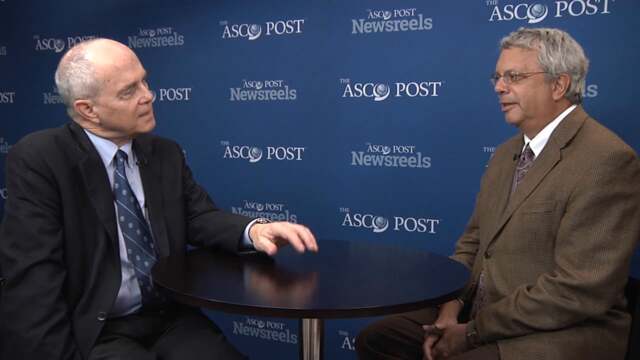Sagar Lonial, MD, and James O. Armitage, MD, on Relapsed/Refractory Multiple Myeloma: The ELOQUENT-2 Trial and a Phase II Study of Daratumumab
2015 ASCO Annual Meeting
James O. Armitage, MD, of the University of Nebraska Medical Center, and Sagar Lonial, MD, of Emory University School of Medicine, discuss results from two important studies that tested lenalidomide/dexamethasone with or without elotuzumab and daratumumab monotherapy (Abstracts 8508 and LBA8512).
Related Videos
Howard M. Sandler, MD, and Christopher Sweeney, MBBS
Christopher Sweeney, MBBS, of Dana-Farber Cancer Institute, and Howard M. Sandler, MD, of Cedars-Sinai Medical Center, discuss the improvement of overall survival with the use of adjuvant chemotherapy following androgen suppression and radiotherapy (Abstract LBA5002).
Charles L. Bennett, MD, PhD, MPP and James O. Armitage, MD
Charles L. Bennett, MD, PhD, MPP of the University of South Carolina College of Pharmacy, and James O. Armitage, MD, of the University of Nebraska Medical Center, discuss the emerging and future benefits of biosimilars.
Eric Van Cutsem, MD, PhD, and Axel Grothey, MD
Eric Van Cutsem, MD, PhD, of University Hospitals Gasthuisberg/Leuven, and Axel Grothey, MD, of the Mayo Clinic, discuss the Italian-led study on trastuzumab and lapatinib in HER2-amplified metastatic colorectal as well as other colorectal cancer findings discussed at ASCO (Abstract 3508).
David E. Gerber, MD, and James L. Mulshine, MD
James L. Mulshine, MD, of Rush University Medical Center, and David E. Gerber, MD, of The University of Texas Southwestern Medical Center, discuss the ALCHEMIST trial, an NCI initiative to address the role of molecular testing and targeted therapies for earlier-stage lung disease (Abstract TPS7583).
Richard G. Margolese, MD, and Robert W. Carlson, MD
Robert W. Carlson, MD, of the National Comprehensive Cancer Network, and Richard G. Margolese, MD, of McGill University, discuss the improvement in breast cancer–free interval with anastrozole vs tamoxifen in patients with ductal carcinoma in situ undergoing lumpectomy plus radiotherapy (Abstract LBA500).





